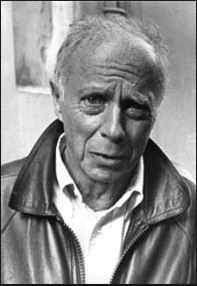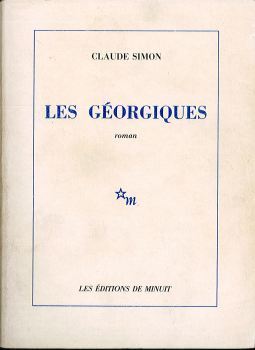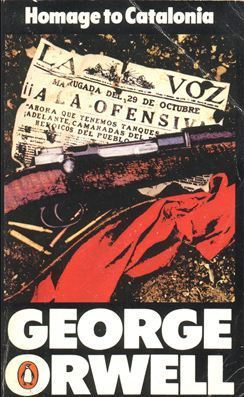Claude Simon, George Orwell and Catalonia
By ADRIAN TAHOURDIN
Before the year is out it would perhaps be right to mark the 100th anniversary of the birth of Claude Simon (above, born on October 10, 1913). In the glut of Gallic anniversaries which I blogged about in October and November there was simply no room to fit him in. Simon, born a few weeks before Camus, considerably outlived him – he died in 2005. Like Camus he was awarded the Nobel Prize (1985). There the similarities end.
Camus’s work is well known but even in France Simon remains little read, being considered difficult. An early nouveau romancier, he only truly found his voice with La Route des Flandres, published in 1960 – the year in which Camus had his fatal car crash. The novel drew considerably on Simon’s disastrous experiences in the French cavalry in the spring of 1940, when the country was overrun in a matter of weeks.
Like an itch in continuous need of being scratched, the war was a theme he returned to repeatedly, notably in the triptych-like novel with the Virgilian title Les Géorgiques of 1981 – the artistic allusion is apt as Simon trained as a painter and was a great admirer of his near-contemporary, the Brut artist Jean Dubuffet.
The outer panels cover 1940 and the Revolutionary period in the shape of the career of an army officer who took part in the storming of the Bastille before retiring to the south-west of the country to tend his vineyards (Simon himself inherited a vineyard). The middle section focuses on a certain English writer identified as "O", and is, in the late Christopher Hitchens’s phrase, “an obsessive reworking of the action of Homage to Catalonia . . . “. In his Why Orwell Matters (2002), Hitchens took strong exception to the way Simon represented Orwell, attributing to him thoughts and sentiments he could not possibly have deduced.
In a (rare) interview to the Review of Contemporary Fiction (Spring 1985), Simon made the bizarre claim that Orwell’s account of the Spanish Civil War was “faked from the very first sentence”: “There is an element of fellow-feeling in my response to Orwell’s personality, and I have a profound admiration for his personal courage. I would unfortunately not be inclined to go so far regarding his intellectual courage and honesty. Without making too much of it, and mentioning only for the record his idyllic description of Barcelona in November 1936, which is little more than a comic tourist guide, I should point out to these same critics that Homage to Catalonia is a work (or rather a piece of special pleading on his own behalf) which is faked from the very first sentence: ‘In the Lenin Barracks in Barcelona, the day before I joined the militia,’ etc”.
The “faked” assertion drew particular scorn from Hitchens. It is a strange claim and one that Simon doesn’t explain satisfactorily. Maybe the interviewer should have pushed him further on it. Orwell himself was in no doubt about the difficulties he faced in reporting: “I have tried to write objectively about the Barcelona fighting, though obviously, no one can be completely objective on a question of this kind. One is practically obliged to take sides" (p153, Penguin edition).
Hitchens later writes “M. Simon had himself been in Spain, though fighting on the side of the Stalintern forces [an implied criticism – Simon was a member of the French Communist Party], and must at some point have believed that ‘History’ did indeed have a point and a direction, and was indeed on ‘his’ side”. Hitchens concludes, fiercely, “The award of the Nobel Prize to such a shady literary enterprise is a minor scandal, reflecting the intellectual rot which had been spread by pseudo-intellectuals”.
But it’s worth stressing that Simon’s portrait of Orwell is far from unsympathetic. He writes: “Having returned to the front line towards the end of May 1937 after a short leave and a winter spent in the trenches on the Aragon front, O . . . is hit during a tour of inspection of the forward outposts by a bullet which goes clean through his neck . . .” (this from the translation The Georgics by Beryl and John Fletcher). Later we read: “There will however be gaps in his story, things left unclear, even contradictions. Either because he takes certain things for granted (his past: the education he received in the aristocratic college of Eton . . .)” (Simon’s grasp of English was, I sense, shaky); and “On the one hand his upbringing (or his dignity – or his natural decency?) preserves him from all boastfulness . . .”.
And finally: “He (O.) also leaving behind him the accredited correspondents perched on their bar stools, busily writing for the organs of the liberal foreign press the articles which he was later to devour on his return with the dejected amazement, the dejected indignation that a survivor of a shipwreck would feel on reading in black and white that there had been neither storm nor shipwreck . . . ”.
Can this be the same Claude Simon that Hitchens viewed with such disdain?
Simon’s last full work, Le Tramway, was published in 2001. I reviewed it in the TLS, suggesting that it “displays all the qualities for which his writing has become celebrated [an exaggeration there surely]: the sweeping, endlessly ramifying clauses (with their parentheses within parentheses), intended to convey a constantly shifting pattern of thought and sensation; the almost photographic description and . . . powerful recourse to memory”. I also called it “a book drenched in the summer sun: the sights and smells of the Mediterranean . . . “. It’s certainly a long way from the polemics over accounts of the Spanish Civil War.
Peter Stothard's Blog
- Peter Stothard's profile
- 30 followers






